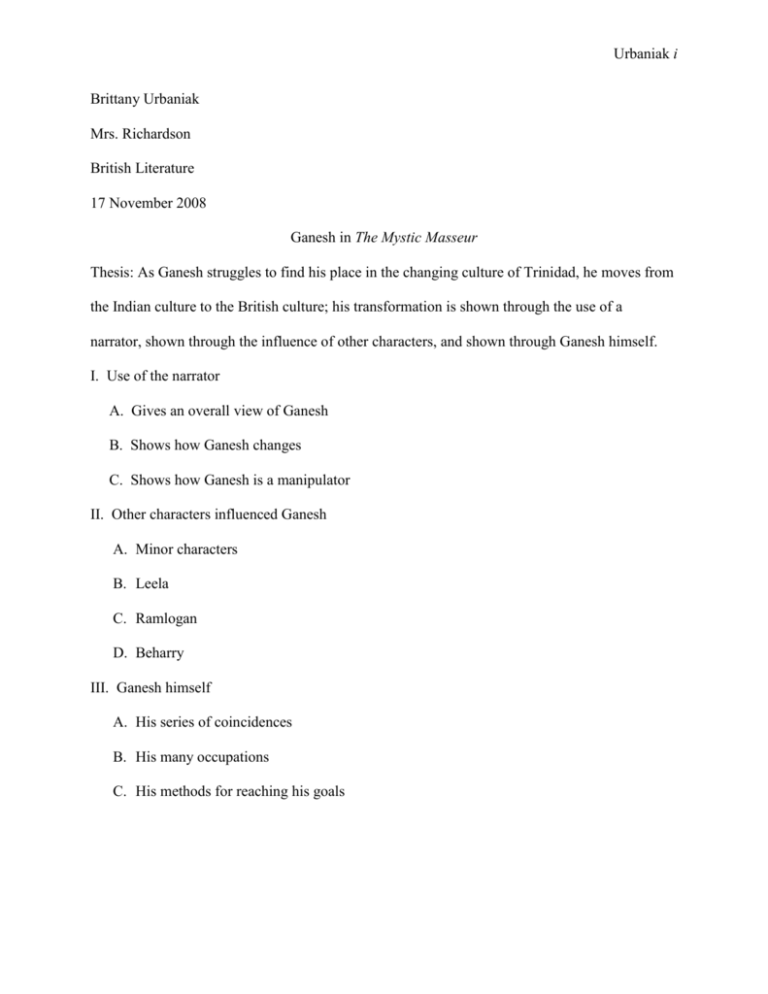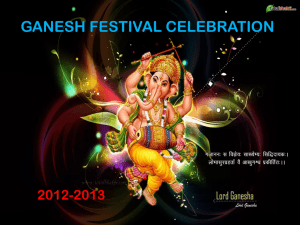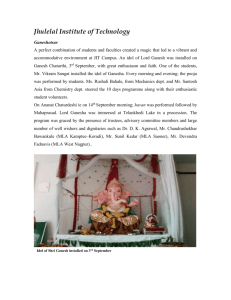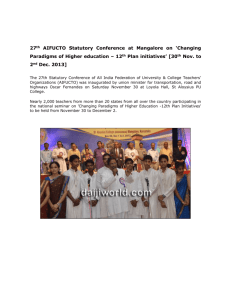Ganesh in The Mystic Masseur
advertisement

Urbaniak i Brittany Urbaniak Mrs. Richardson British Literature 17 November 2008 Ganesh in The Mystic Masseur Thesis: As Ganesh struggles to find his place in the changing culture of Trinidad, he moves from the Indian culture to the British culture; his transformation is shown through the use of a narrator, shown through the influence of other characters, and shown through Ganesh himself. I. Use of the narrator A. Gives an overall view of Ganesh B. Shows how Ganesh changes C. Shows how Ganesh is a manipulator II. Other characters influenced Ganesh A. Minor characters B. Leela C. Ramlogan D. Beharry III. Ganesh himself A. His series of coincidences B. His many occupations C. His methods for reaching his goals Urbaniak 1 Ganesh in The Mystic Masseur The Mystic Masseur by V.S. Naipaul tells the story of Ganesh, a Hindu trying to find where he belongs in a society split between the Indian and British cultures. Ganesh is living in a time where Great Britain still has a major influence over India, and Trinidad, the country where he lives, is caught between the two cultures of the countries. Ganesh sees this separation between the two but does not know to which country he should belong. He is torn between the Indian culture from which his father was a part of and of the British culture that could allow him to learn, since at that time, attending college was seen as a part of the British culture. The story develops as Ganesh changes his career; with each different one he moves closer to accepting the British culture. As Ganesh struggles to find his place in the changing culture of Trinidad, he moves from the Indian culture to the British culture; his transformation is shown through the use of a narrator, shown through the influence of other characters, and shown through Ganesh himself. The narrator is used to show how Ganesh changes throughout the novel. The novel starts with the narrator’s meeting Ganesh when he is a masseur, a medical practitioner who uses mysticism in his treatments, to have him heal the narrator’s swollen foot. The narrator uses this beginning to show how he met Ganesh and to later show how he comes to write the autobiography. He says, “I myself believe that the history of Ganesh is, in a way, the history of our times” (Naipaul 8). The narrator believes that Ganesh’s history shows the changes in Trinidad’s culture. Each time that Ganesh moves to a different career, it marks a shift in the culture of Trinidad. The narrator sees this throughout the novel as he retells the story of Ganesh’s life. N. Ramadevi says, “In the course of presenting the life story of a man who keeps changing roles in the Caribbean community and meets with sufficient success of imperial Urbaniak 2 distinction, the narrator touches upon…public success and private fulfillment” (26). Ganesh serves as representation of life in Trinidad and every time he moves to a different job he is showing how he is fulfilling public sentiments as well as his own personal ambition for success. Ganesh starts substituting for a teacher, moves to different careers, and ultimately becomes a politician. The narrator expands the focus of the novel then to show that the people see Ganesh’s success as something to strive for after they read Ganesh’s novel The Years of Guilt, an autobiography of Ganesh. Ramadevi notices the narrator’s knowledge and comments, “[T]he narrator who maintains a neutral tone is an intelligent observer who understands the whole situation well” (25). The narrator knows all of Ganesh’s life before he writes the novel and uses this to know when to expand his view to show the correlation and differences between the people’s views and Ganesh’s views. One critic says, “Through his [the narrator’s] timely comments, juxtapositions, humorous deflation, he exposes the gap between the masseur’s version of events and what really happened…” (Ramadevi 26). The narrator uses some quotations from The Years of Guilt to show Ganesh’s views on issues and how he attributes his success only to the will of Providence, a British term, when in reality had a lot of help from other people. The narrator points this out when he says, “Ganesh was undoubtedly inspired by the Hollywood Hindus but what he says owes nothing to them” (108). Here Ganesh is manipulating the real version of events with the version he wants everyone to see. He excludes references made to the Indian culture and only allows the references to the British culture to be mentioned. The narrator says, “Ganesh had begun to find his mystic career an embarrassment” (201). Ganesh did not want his mystic career, an Indian cultural career, to be associated with him now because he wanted to fully embrace the British culture and to be seen as having followed that culture all along. Urbaniak 3 At the end of the novel it is seen that Ganesh is totally integrated into the British culture and has rejected the Indian culture. The narrator says, “‘Pundit Ganesh,’ I [the narrator] cried…‘Pundit Ganesh.’ ‘G. Ramsay Muir,’ he said coldly” (208). Ganesh rejects his Indian name and adopts an English name to go with his political career. By addressing him as Pundit Ganesh, the narrator unintentionally reminds Ganesh of his Indian culture which he refuses to acknowledge. Shashi Kamra asserts, “Ganesh’s gesture of non-recognition [of the narrator] and denial reveals…his suppression of all sense of loyalty to his past in a desire to fill out a role” (60). Ganesh so desperately wants to embrace the British culture that he is willing to ignore the narrator even though he had healed the narrator’s foot at the beginning of the novel. The narrator sees this and is surprised by Ganesh’s reaction to being called pundit, another name for a masseur. It is by this reaction that it can be fully understood how much Ganesh changes throughout the novel. In the beginning Ganesh is a masseur who uses his Indian culture to heal people and then at the end he is a politician fully ensconced in the British culture. While the narrator sees the changes Ganesh undergoes to embrace the British culture, the narrator also shows how other characters influence Ganesh. A minor character only mentioned at the beginning of the novel was Mr. Stewart; he “pretends to be a Hindu mendicant, [but] is in reality a disaffected English millionaire” (Ramadevi 28). He chose to give up the British culture in order to embrace the Indian culture; he “takes a particular liking to Ganesh” (Bhattacharya 257) and uses his own transition between cultures to influence Ganesh. Mr. Stewart says, “One day you may even bring it all out in a book….One day you may go to London….[and be] involved there [in politics]” (30). Ganesh ultimately follows the advice of Mr. Stewart and chooses to follow career paths that Mr. Stewart was afraid to get involved in because these paths were ones that lead to the British culture. Ganesh does write his autobiography, Years of Guilt, Urbaniak 4 and at the end of the novel Ganesh travels to London after he enters the world of politics. Another minor character who helps Ganesh is his aunt The Great Belcher, named so because she belches a lot. She is associated with the British culture in the novel because she takes care of a woman named King George. She “stands alone in her timely visits to advise Ganesh as to the best moves at crucial points in his career” (Hamner 221). He meets her after he marries Leela and she gives him marriage advice. While they are talking he mentions that he wants to massage people, but she quickly tells him that there are too many masseurs in Trinidad so he should find something else. He then mentions that he wants to write books and she immediately latches onto the idea. The Great Belcher says, “Once you put your mind to it, you could go write nice nice books” (48). She is hinting that he could become wealthy from writing books and that she thinks that this is a good career path for him to take instead of being a masseur. The Great Belcher knows that a masseur is only in the Indian culture but writers can be found in any culture like the British culture. Throughout the novel, Leela, Ganesh’s wife, is seen as a major influence on his life. Leela has received an education which has made her realize what kind of opportunities are available for people. After she marries Ganesh, she notices that he does nothing but think. When she asks him, “‘Man, why you ain’t writing…[a] book….Ganesh replied, ‘Leela,…you can’t see that I thinking, thinking about it all all the time.’ He never wrote the book” (65). It is the way of the Indian culture that allows a man to be able to think without earning money because “in India,…people coming from all over the place, some bringing…food, some bringing…clothes” (77). The people of the Indian culture would not have allowed them to do without food or adequate clothing if Ganesh was not earning money, but in Trinidad nobody bothers to help the poor because of the British culture arising in Trinidad. When Leela leaves Urbaniak 5 him because she is tired of being poor, Ganesh decides to write the book in order to bring back his wife. Leela wants Ganesh earn a large salary because she is jealous of her sister’s wealthy husband. Robert Hamner says, “As [the] jealousy…gain[s] in strength….[s]he instigates a scheme…[to] monopolize the taxi service that transports clients to the mystic [Ganesh]” (220). Taxis drove the clients to Ganesh so they could receive his help in curing them of whatever ailed them. Unbeknownst to him, Leela and Ramlogan, her father, charge an outrageous price for the clients to use the taxis. Ganesh is very angry when he finds out and buys the taxis from Ramlogan in order to run the taxi service for free, but Leela convinces him to charge four shillings for the ride, a lot cheaper than the price Ramlogan is charging. In this way Leela is pushing Ganesh to become more like her sister’s husband who has adopted the British culture in order to live extravagantly. She is tired of the Indian culture where women have to work every day and submit themselves to the will of their husbands; Leela wants to be able to take vacation and travel but cannot do this so long as Ganesh is embracing the Indian culture. Ramlogan and Beharry in their own way also manipulate Ganesh and influence his move towards the British culture. Ramlogan “always looks out for his own best interests” (Hamner 220) and uses Ganesh as his tool to achieve his “best interests” (Hamner 220). Ramlogan convince Ganesh to take his daughter Leela in marriage for a cheap bride price, but Ganesh sees this maneuvering and decides to get as much money from Ramlogan as he can. After the wedding when Ganesh was about to eat the kedgeree, he sat there until he had “got from Ramlogan: a cow and a heifer, fifteen hundred dollars in cash, and a house in Fuente Grove” (45). It was tradition that the father gives money to the groom until he eats the kedgeree, and Ganesh uses this Hindu tradition to swindle Ramlogan. Ramlogan is shocked by Ganesh’s actions because Ganesh had said, “When it come to eating the kedgeree, I go eat quick” (40), Urbaniak 6 which meant that he would eat the kedgeree quickly so Ramlogan would only have to pay a small bride price. By making Ramlogan pay more for the bride price than was originally agreed on between them, Ganesh is moving away from the Hindu tradition. Ramlogan’s ploy had failed but worked to influence Ganesh’s ultimate decision to discard the Indian culture. Beharry continues what Ramlogan started. Beharry is a traditional character who subtly influences Ganesh. When Ganesh decides to run for a political office, Beharry was the main person who influenced Ganesh’s decision. Beharry brought The Hindu, a local newspaper, to Ganesh to read; in it was an opinion column devoted to “a little bird” (140) in which someone wrote degrading remarks about Ganesh. Beharry brings every newspaper with the remarks each time the paper was released and encourages Ganesh to retaliate against the little bird. He is pushing Ganesh to take up a political stand because they both knew the bird was Narayan, who is jealous of Ganesh’s fame from being a masseur and wants to show Ganesh that Narayan, too, could become famous by becoming a politician. Ganesh finally decides to run for election to appease Beharry and Leela and the Great Belcher who had both also taken offense at what the bird was saying in The Hindu. A politician is a not a part of the Indian culture but is an aspect of the British culture where politics run the government. Once he becomes a politician, Ganesh is fully established in the British culture. While the characters influence Ganesh’s change greatly, the transformation of his character is best shown through Ganesh himself. On day that his father dies, Ganesh decides to quit his teaching job. Later he writes in The Years of Guilt, “My father had died that Monday morning…just about the time…when I …was deciding to give up my teaching job. I was much struck by the coincidence” (21). Ganesh believes that he was supposed to give up his teaching job at that moment because he was destined to do something far greater in his life. After his Urbaniak 7 father dies, Ganesh inherits oil royalties given by England from his father. These royalties last until after Ganesh is married to Leela and has received the large dowry from her father. Ganesh sees this as a sign “that big things were ahead of him” (56), when in reality it is only coincidence that the oil royalties ran out at the time he married Leela. These two accidental occurrence fuel Ganesh into believing that he is to take every chance he is offered to change his career and move closer to the British culture. Ganesh begins movement to the British culture by being a teacher but then decides to write a book. Divya Sood suggests, “[W]e see a distinct departure from the Ganesh who aspires to be the British intellectual to the Ganesh who, after acquiring a British education, uses the English language to write a book on the Hindu faith” (99). Ganesh did not like the profession of teaching and decides to go back to his home; but he has had a taste of the British culture and incorporates it into the novel he writes on the Hindu faith while still maintaining his Indian culture. He then tries to fully embrace his native culture again as he becomes a masseur. As a masseur though Ganesh feels as if the people who come to him are really only people who have deluded themselves into believing that something is there that is not. His British education does not allow him to believe in the mysticisms that a masseur employs to treat clients and so “Ganesh rejects his mystic identity altogether and… [is] reborn as a British politician” (Sood 100). Ganesh changes his career to that of a politician so he could move away from his Indian culture and into the British one. Ganesh uses dubious methods to become a part of the British culture. He is “an ambitious and independent man” (Kamra 60) and uses this ambition to drive him to move through his different careers to become a politician. Ganesh “asserts his independence of thought again and again, rejecting his superstitious, materialistic and garrulous society” (Kamra Urbaniak 8 61). His rejection of his Indian culture allows him to fully embrace the British culture. He does not want to be associated with the superstitions the Hindus believe. His career as a masseur showed that the people would believe anything that he said so long as there was an air of mysticism to his words or if he chanted in the Hindu language. When a mother brings her son to Ganesh for him to banish a threatening cloud, only her son could see, from her son, Ganesh he chants in Hindi and has Leela interpret him. The son soon begins to believe that the cloud is gone and believes that it is all of Ganesh’s doing that has saved him from the cloud. Leela later asks Ganesh, “‘Oh, man, don’t tell me you use a trick on them.’ Ganesh didn’t say” (125). Ganesh had only seemed to banish the cloud; he had tricked the people into thinking that he could chase the cloud away, when in reality he had only convinced the boy that the cloud was not there. He uses the Indian culture to help the mother and son, but it is seen by his silence to Leela’s question that he no longer believes in the culture. It is after this incident that Beharry is able to convince Ganesh to become a politician. Gordon Rohlehr says, “Ganesh, who poses as a defender of Hinduism while it is politic and profitable to do so, completely rejects his Indian dress and changes his name to G. Ramsay Muir once he becomes a successful politician” (180). After Ganesh becomes a politician he decides to accept the British culture wholly and reject his Indian culture because that culture would not earn him the money that he was making as a politician. Once Ganesh fully embraces the British culture, he is no longer the man torn between the two cultures in Trinidad; his has decided which culture he likes the best. He goes from the masseur to an accomplished politician, both encompassing one of the cultures while neglecting the other. The narrator and the characters in the novel served as a background on which Ganesh could be evaluated and influenced. Ganesh himself also helped the transition with his inherent Urbaniak 9 ambition for success and his belief in the coincidences that happened in his life. The Mystic Masseur by V.S. Naipaul illuminates the transition of Ganesh into the British culture by the use of the narrator, the use of the characters, and the use of Ganesh himself. Urbaniak 10 Works Cited Bhattacharya, Baidik. "Naipaul's New World: Postcolonial Modernity and the Enigma of Belated Space." Novel: A Forum on Fiction 39.2 (Spring 2006): 245-267. MLA International Bibliography. EBSCO. Mississippi U for Women Lib., Columbus, MS. 25 Sep. 2008 <http://search.ebscohost.com/login.aspx?direct=true&db=mzh&AN=2008530169&site=e host-live>. Hamner, Robert. “Character and Setting.” Critical Perspectives on V.S. Naipaul. Ed. Robert D. Hamner. Washington, D.C.: Three Continents, 1977. 208-39. Kamra, Shashi. The Novels of V.S. Naipaul: A Study in Theme and Form. New Delhi: Prestige, 1990. Naipaul, V.S. The Mystic Masseur: a Novel. New York: Vintage, 1957. Ramadevi, N. The Novels of V.S. Naipaul. New Delhi: Prestige, 1996. Rohlehr, Gordon. “The Ironic Approach: The Novels of V.S. Naipaul.” Critical Perspectives on V.S. Naipaul. Ed. Robert D. Hamner. Washington, D.C.: Three Continents, 1977. 17893. Sood, Divya. "Empire, Power, and Language: the Creation of an Identity in V.S. Naipaul’s the Mystic Masseur." Atenea 27.1 (June 2007): 93-101. Literary Reference Center. EBSCO. Mississippi U for Women Lib., Columbus, MS. 25 Sep. 2008 <http://search.ebscohost.com/login.aspx?direct=true&db=lfh&AN=27946019&site=ehos t-live>.






